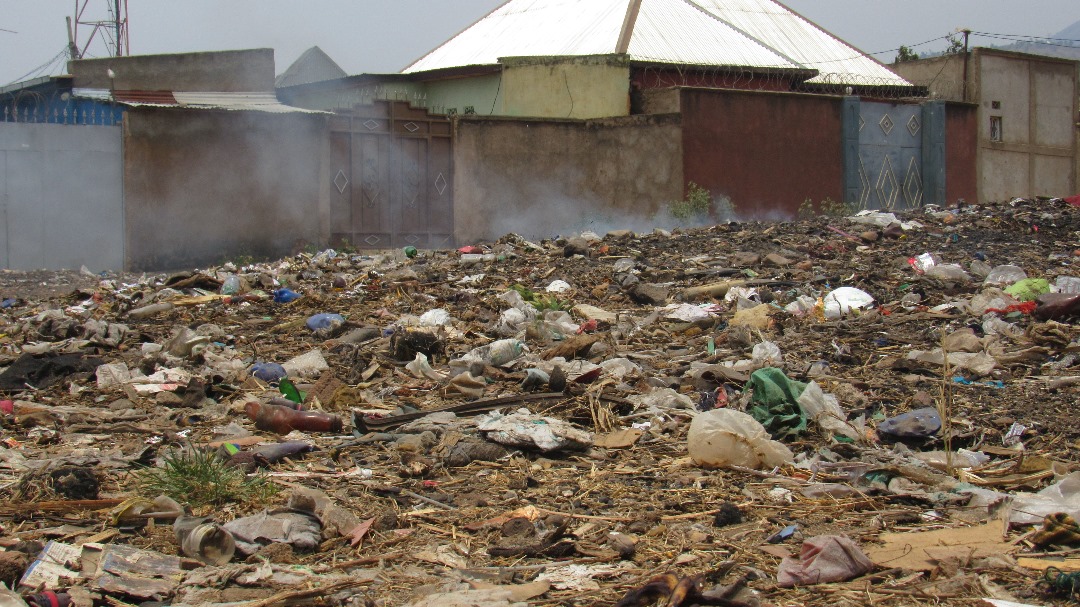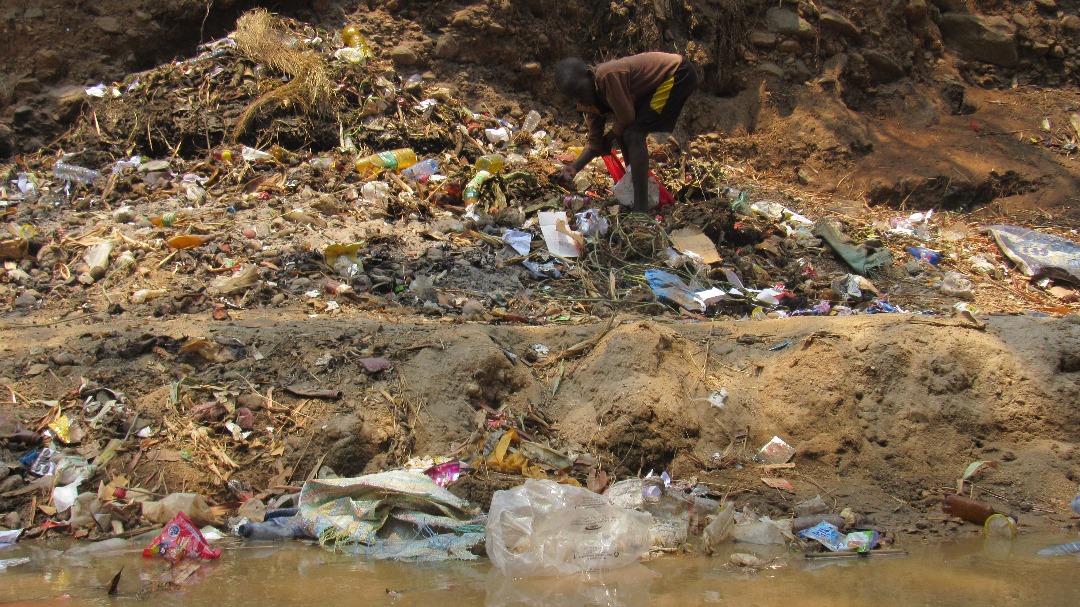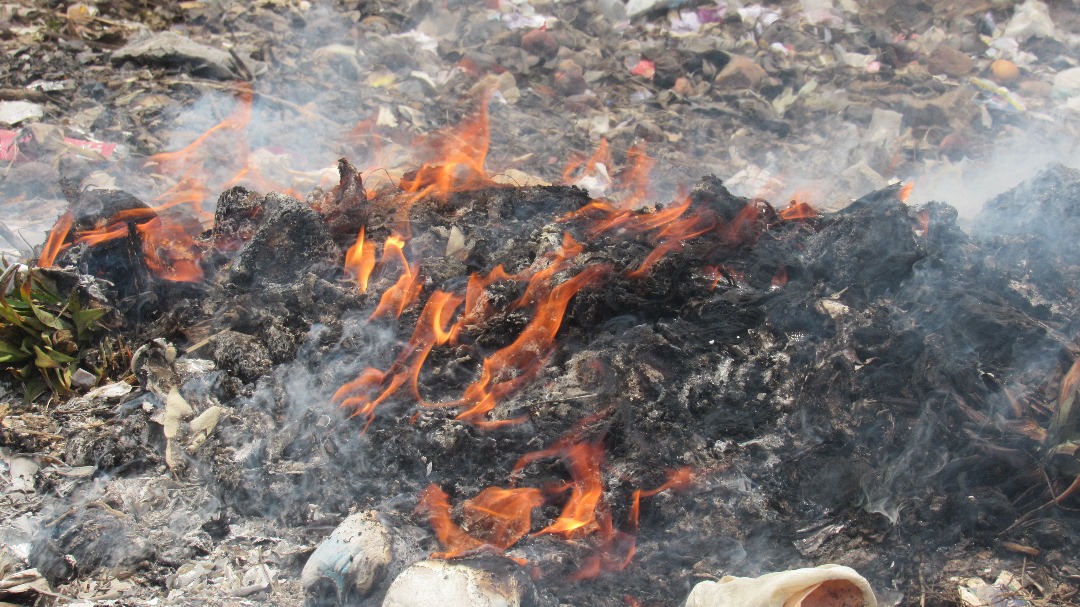Almost fifteen years after involving the private sector in waste collection, waste continues to decompose in domestic dumps, rubbing shoulders with Burundians and threatening their health. To evacuate household waste, Burundians resort to dangerous methods that increase insalubrity and pollute the waters of rivers and Lake Tanganyika. One of the factors making the waste management service inefficient is the monopoly.
By Arthur Bizimana
Waste is overflowing, accumulating on the ground and decomposing into maggots at the Aline Kanyange household waste dump in the Nyakabiga urban zone of Bujumbura town hall on 20 September. Beside the latrines, the rubbish dump gives off an unbearable smell and is teeming with flies.
“The rubbish is starting to decompose into maggots. If nothing is done, we’re exposed to all sorts of diseases linked to unsanitary conditions,” worries Kanyange Aline.
According to the Third National Communication on Climate Change published in 2019 by the Ministry of the Environment, Agriculture and Livestock, each resident of Bujumbura produces an average of 0.6 kilograms of waste per day, equivalent to 217 kilograms per year.
However, the rate of removal of waste before 2010 was 8%. At the time, it was the Municipal Technical Services (SETEMU) that collected the waste.
It was only in 2010, thanks to the involvement of private companies in waste collection, that the latter increased to 46%.
The waste collection company workers don’t sort the rubbish,’ says Kanyange. They collect all the waste in bulk, without protection, and load it onto an old lorry before driving off. They are not even cooperative. Kanyange is concerned about the hazardous waste that is dumped on the ground during collection.

The Third National Communication on Climate Change points out that 57% of waste is fermentable and 43% non-fermentable.
According to the study by W. Ndayikeza, published in 2014 by the University of Burundi on the contribution to municipal solid waste management in Bujumbura by a partial anaerobic co-digestion process followed by composting: “Bujumbura does not have a waste treatment system called “leachates” that eliminates harmful contaminants and organic substances likely to pollute surface water and groundwater. Hence the pollution of Lake Tanganyika caused by the fermentable fraction mixed with rainwater.”
Unloading delays
Kanyange has no memory of the last time the refuse collection companies picked up household waste, but she believes it was more than two months ago.
According to G. N, an agent for the private waste collection company in Nyakabiga, waste is collected once every fortnight.
“In all the years I’ve lived here, I’ve never seen them pick up the rubbish on time,” complains Aline.
According to Kanyange, waste collection companies are regular in collecting waste management fees and irregular in collecting waste.
Delays in unloading can also be seen in the northern districts of Bujumbura: ”Three or four months can go by without any waste collection companies coming to collect the rubbish,” says Emelyne Kamikazi, a resident of the Kinama urban area.
“Because of delays in waste collection, we don’t have a place to put our rubbish. It accumulates until it blocks our gates. As a result, our households stink, are full of flies and land on us and our kitchen utensils all the time. We now fear for our health”, she added.
In the various districts of the political capital, Gitega, young people collect rubbish on rickshaws as they go from household to household. According to Alexis Nisengwe, there are also delays in collection.
These waste pickers dump the rubbish in the Bwoga I, Stade and Wankana district. Hence the mountains of rubbish. Collection fees for each household vary between 2,000 and 4,000 Fbu per month.
According to the study on the economic analysis of household waste management in the city of Bujumbura, conducted by Mugisha Jean Claude and published in 2020: “the market for household waste management services in the city of Bujumbura is a market with imperfect oligopoly competition. For this result, the inefficiency of the waste management service is linked to the fact that this market is close to monopolies.”
To ensure the competitiveness and efficiency of this service, this expert recommends pure and perfect competition.
Show your receipts to gain access to the administration service!
“To ensure that we are in good standing with the waste collection companies, officials in the Nyakabiga zone demand monthly waste collection receipts every time we request an administrative service,” says Kanyange.
“If you don’t comply, they first send you to the waste collection companies to sort things out, and then they send you back to get the service you need,” she continues bitterly.
Aline wishes that officials in the Nyakabiga zone would be as strict with the waste collection companies as they are with themselves.
“Waste collection fees are paid according to household size. They vary between 4,000 FBU and 5,000 Fbu per month. Waste collection fees increase from one year to the next. On average, the increase is 1,000 Fbu a month each year, or 12,000 Fbu a year for each household,” says Aline.
In some districts, waste management services are almost non-existent. According to article 17 of the Burundian law of 2018 on the hygiene and sanitation code, communes are required to set up a household waste management system and organise the transport and intermediate and final storage of waste.
Of Burundi’s 18 provinces, only Bujumbura City Hall and the urban zone of Gitega have appropriate services for the removal of household waste in the cities, according to the Third National Communication on Climate Change.
Even in Bujumbura town hall, the waste management service is almost non-existent in some districts.

All kinds of rubbish accumulate on the paths, between the plots and in front of the fences of the houses in the Kajiji district, in the urban zone of Kanyosha, ten kilometres from the heart of Burundi’s economic capital. Plastic waste flourishes. “Our district is very dirty,” laments Joëlle Akimana, a local resident.
“All the household rubbish is collected in garbage bags. The collectors often go from door to door to collect it for money,” says Joëlle Akimana.
Collection fees vary according to the collector. “If the collectors are adults, they charge 5,000 Fbu per bag of rubbish, while if they are children, they charge 3,000 Fbu,” explains Joëlle.
Article 18 of the aforementioned law stipulates: “in urban zone such as Kajiji,…. waste is taken to well-equipped temporary depots located on the outskirts of districts…” Unfortunately, there are no temporary depots in Kajiji, says Akimana.
According to Akimana, the household waste collectors used to throw it away at the kajiji (kizingwe) football ground. However, the head of the kizingwe district, Ferdinand Minani, has formally forbidden them to do so.
Plastic waste and other rubbish caught fire when we went there. According to Divin Ndikuriyo, a resident of the Kajiji district, they ignore those who set fire to the rubbish.
The above-mentioned study by Mugisha Jean Claude nonetheless indicates that women and children, who sort through these rubbish dumps on a daily basis for their livelihood, are the cause of the rubbish fires.
Since the ban on dumping rubbish at the football ground, they have been secretly throwing it into the River Kizingwe: “For fear of fines, they hide the rubbish in buckets, pretending to fetch water from the Kizingwe River in the evening, and throw it into the river”, says Joëlle Akimana.

“Rubbish management is a serious problem in Kajiji. During the night, our neighbours throw it away in front of the fence gates, on the paths that link the neighbourhoods and between the boundaries of the plots,” reveals Akimana.
During the rainy season, many people throw household rubbish out into the street: “When it rains, it’s an opportunity to dispose of household waste in the street and in the gutters. If there is a lot of erosion, the household waste is washed into Lake Tanganyika; if there isn’t, the waste is spread over the ground and clogs up the gutters,” explains Akimana.
Joëlle is stunned by the household rubbish that is strewn on the ground and filled in the gutters after it rains: “Sometimes we wonder if it’s the rubbish that’s just rained down.” If they are caught, they are fined around 50,000 Fbu,’ says the neighbourhood chief.
What about unloading public bins?
While the collection of household waste is delayed in almost all districts of the town of Bujumbura and the urban area of Gitega, the unloading of public bins remains problematic.
In the various strategic corners where they have been installed in the urban commune of Mukaza, these bins are full of plastic and food waste. Most of them are overflowing. Some are rusty, while others are in a sorry state, showing signs of imminent destruction. In corners that are far from the city centre or in districts, these bins are like scarecrows. Passengers are wary of them and often throw the rubbish into the gutters or onto the street.
According to article 218 of the above-mentioned Burundian law: “Anyone who throws away paper, plastic packaging or other waste outside the facilities provided for this purpose is liable to a fine of five thousand Burundian francs (5000 Fbu).” However, this punishment is never applied.
The unsanitary conditions in Bujumbura led President Evariste Ndayishimiye to declare the period from 12 to 16 August 2024 as ‘cleanliness week’ on 10 August 2024. He asked state officials to temporarily suspend their bureaucratic activities in order to concentrate on hygiene issues at work.
In Nyakabiga as in Kinama, they are sounding the alarm for the government to be strict with the waste collection companies. Otherwise, they are exposed to diseases caused by dirty hands.
In the south of the economic capital, Bujumbura, residents are calling for a system to be put in place to manage household waste and temporary depots.


